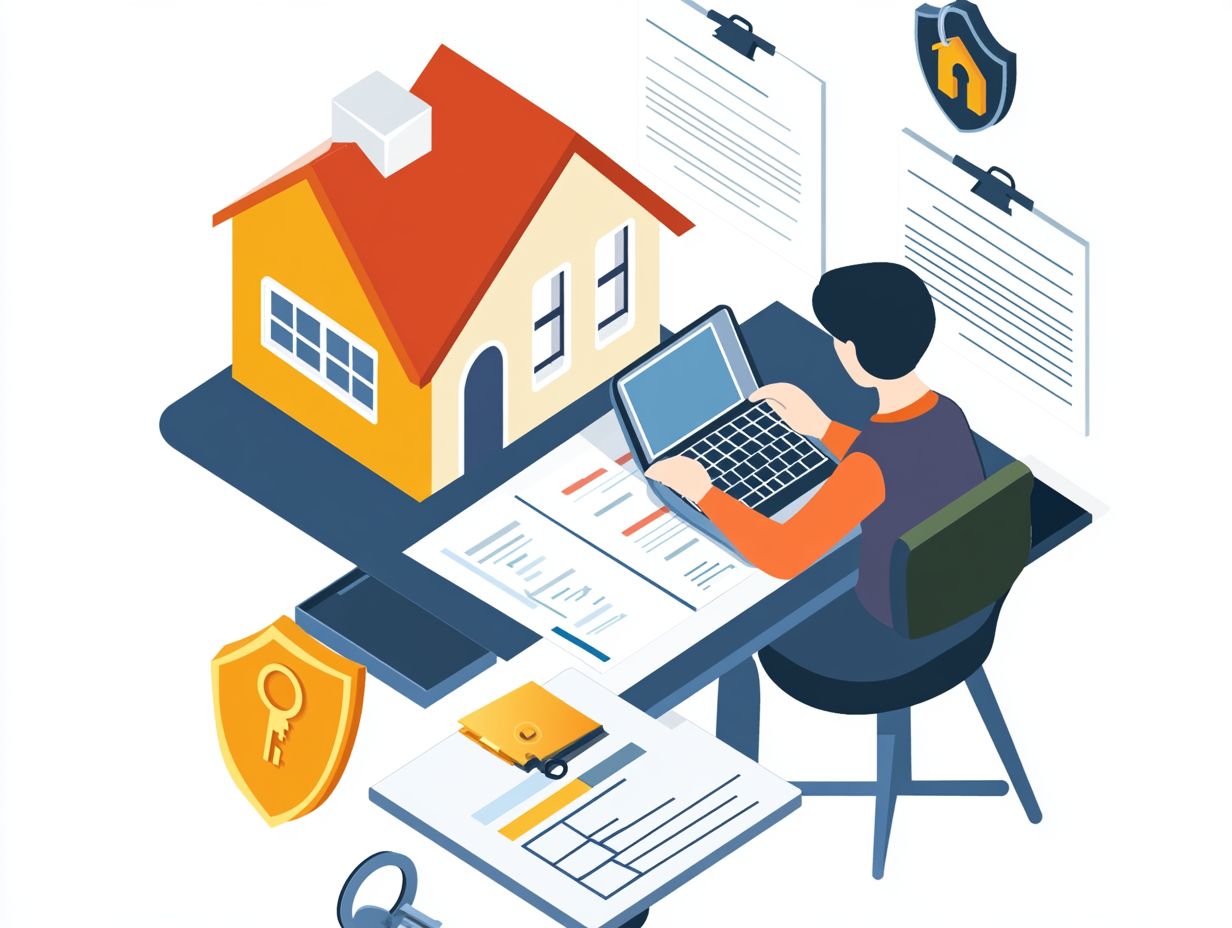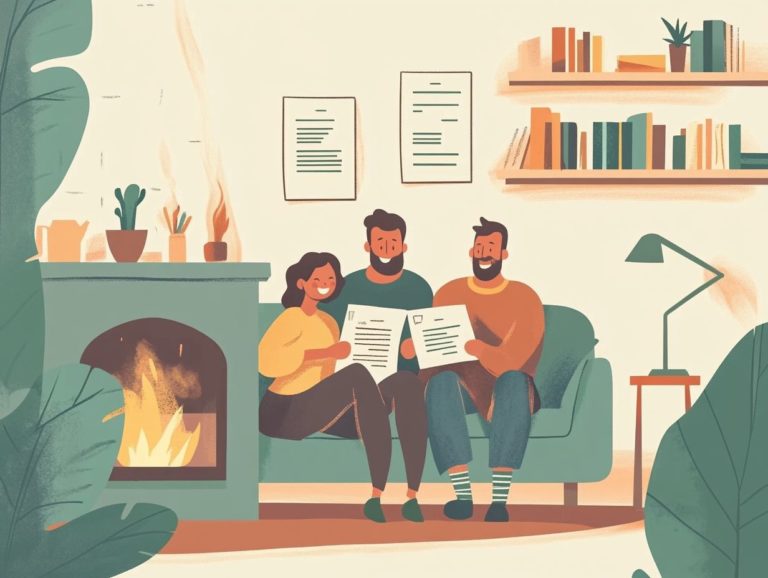Top 10 Home Insurance FAQs You Should Know
Home insurance goes beyond being a mere safety net; it represents essential protection for one of your most significant investments your home.
Grasping the nuances of home insurance is vital, whether you’re stepping into homeownership for the first time or reassessing your current coverage.
Let s explore the top 10 burning questions about home insurance!
Delve into these insights that can enhance your decision-making and give you the peace of mind you deserve.
Contents
- Key Takeaways:
- 1. What Is Home Insurance and Why Is It Important?
- 2. What Does Home Insurance Cover?
- 3. Are There Different Types of Home Insurance Policies?
- 4. How Much Home Insurance Coverage Do I Need?
- 5. What Factors Affect the Cost of Home Insurance?
- 6. Can I Bundle Home Insurance with Other Policies?
- 7. How Do I File a Home Insurance Claim?
- 8. What Happens If My Home Is Uninhabitable After a Covered Event?
- 9. Are There Any Exclusions to Home Insurance Coverage?
- 10. How Can I Lower My Home Insurance Premiums?
- What Should I Do If I Want to Change My Home Insurance Policy?
- Frequently Asked Questions
- What is home insurance and why do I need it?
- What does home insurance cover?
- How much home insurance coverage do I need?
- What is the difference between replacement cost and actual cash value?
- Are there any exclusions to home insurance coverage?
- How can I save money on home insurance?
Key Takeaways:

Home insurance is important for protecting your property and belongings from unexpected events. It typically covers damage from natural disasters, theft, and liability for accidents on your property. Factors like location, coverage amount, and policy type can affect the cost of home insurance.
1. What Is Home Insurance and Why Is It Important?
Homeowners insurance serves as essential financial protection for property owners, shielding you from losses like fire and water damage, as well as liability claims. Understanding its importance grants you peace of mind.
With options like the California FAIR Plan, you can ensure that your investment is fortified against a range of risks, including natural disasters and accidents that could lead to significant financial burdens.
Home insurance protects you from the costs of repairing or replacing damaged belongings and provides liability coverage if someone is injured on your property.
Navigating home insurance can feel overwhelming, but it’s crucial for your peace of mind. Insurance agents can help you decipher various policies, clarify what is covered and what isn’t, and guide you through the claims process when necessary.
Understanding your liability coverage is key to protecting yourself. By implementing effective property safety measures, you can further minimize risks and be better equipped to handle unforeseen events.
2. What Does Home Insurance Cover?
Homeowners insurance offers a robust suite of coverage options designed to protect your home and personal belongings from various risks, including fire and water damage, while also providing essential liability protection.
These protections include dwelling coverage, which handles repairs or rebuilding costs if your home suffers damage from specific events like storms or vandalism. Personal property protection safeguards your belongings from cherished furniture to electronics ensuring losses from theft or accidental damage are compensated.
Liability coverage assists with legal fees and damages if someone is injured on your property. You ll appreciate knowing that your policy covers additional living expenses, offering support for temporary housing during significant repairs.
Common claims stem from unfortunate incidents like a fire that damages parts of your home or water damage from plumbing issues. These scenarios highlight the importance of having comprehensive coverage options in your everyday life.
3. Are There Different Types of Home Insurance Policies?
There are various types of homeowners insurance policies designed to cater to your specific needs. For those in high-risk areas, options like the California FAIR Plan are available, alongside standard policies that cover typical perils such as fire and water damage. If you have more inquiries, check out common home insurance questions answered.
You might consider policies like HO-1, which offers bare-minimum coverage, or HO-3, a comprehensive plan covering most perils unless specifically excluded. If you re a renter, HO-4 is tailored for you, while HO-5 provides extensive protection for both your personal property and the dwelling itself.
For condominium owners, HO-6 policies ensure that your belongings are protected within shared spaces. Each option offers unique benefits, and when combined with specialized coverages like flood insurance, they create a strong safety net for your needs.
4. How Much Home Insurance Coverage Do I Need?
Determining the right amount of homeowners insurance coverage is crucial. It involves assessing your coverage limits, deciding between replacement cost or actual cash value, and conducting a thorough home inventory to ensure all your personal property is safeguarded.
First, reflect on the total value of your possessions, including any recent renovations that may have enhanced your home’s worth.
Create a detailed home inventory, listing all your items along with their approximate values. This not only streamlines the claims process later but also reveals any gaps in your coverage.
Understand replacement costs and actual cash value. Replacement costs refer to buying new items, while actual cash value considers depreciation. This understanding is essential for making informed decisions.
By taking these steps, you can ensure that you are adequately protected against potential liabilities and losses.
5. What Factors Affect the Cost of Home Insurance?
Several factors influence your homeowners insurance premiums. The deductible amount you select, the presence of security systems, and the claims history related to your property especially regarding fire and water damage are key factors.
Your geographical location significantly impacts your rates. If your home is in an area prone to natural disasters or high crime rates, you may face higher premiums. The age and condition of your home, as well as its construction type, also contribute to pricing. Older structures often require more maintenance and can be more vulnerable to damage.
Homes equipped with modern safety features, such as security systems, smoke detectors, and advanced locks, can enjoy discounts. Choosing a higher deductible can lower your premium costs, but be mindful that this comes with greater financial risk if you need to file a claim.
6. Can I Bundle Home Insurance with Other Policies?

Bundling your homeowners insurance with other policies, like auto insurance, can lead to significant discounts and streamline your overall coverage through a single agent. This strategy simplifies your financial management, allowing you to focus on one premium payment and policy renewal date.
By combining policies, you may unlock enhanced coverage options that provide better protection without a hefty increase in costs. Many insurance companies offer packages that cover homeowners, auto, and even life insurance, enabling you to potentially save up to 25% on total premiums.
Talking with your insurance agent opens up exciting benefits and options! Discuss the specific advantages you can enjoy, along with any additional coverage perks that might not be available if you purchase policies separately.
7. How Do I File a Home Insurance Claim?
Filing a home insurance claim involves a step-by-step process. You need to document the damage, contact your insurance agent promptly, and provide the necessary information to ensure a smooth resolution.
Start by gathering all pertinent documentation, including photographs of the damage, receipts for any repairs, and detailed notes about the incident. Understanding the claims process is crucial; familiarizing yourself with the specific requirements outlined in your policy can save you both time and effort.
Effective communication with your insurance agent is essential. Clearly articulate the situation and provide requested documents without delay. As you navigate this process, be aware of common pitfalls. Delaying the filing or neglecting to keep copies of correspondence can lead to unnecessary complications.
To expedite your claim, take a proactive and organized approach. This often leads to quicker resolutions. Contact your insurance agent without delay to ensure you don t miss out on your benefits!
8. What Happens If My Home Is Uninhabitable After a Covered Event?
If your home becomes uninhabitable due to a covered event like fire or water damage, your homeowners insurance policy typically covers additional living expenses. You won t have to worry about where to stay while your home is being repaired.
These additional living expenses include costs for temporary lodging, meals, and other necessary arrangements that exceed your usual costs. Knowing what qualifies as a covered event according to your policy is essential. Covered events can range from natural disasters to theft.
You can prepare for unexpected situations by:
- Keeping thorough documentation of your belongings,
- Familiarizing yourself with your insurance terms, and
- Having emergency contact numbers readily accessible.
Being proactive in these areas reduces stress during a crisis and helps you recover more quickly when filing claims.
9. Are There Any Exclusions to Home Insurance Coverage?
Homeowners insurance policies often come with specific exclusions that limit your coverage. This is particularly true for natural disasters like earthquakes and floods. If you want to protect yourself against those risks, you ll likely need separate flood insurance.
Additionally, damages from poor maintenance, mold, or pest infestations are often not covered. This could leave you responsible for the entire repair cost. Understanding these exclusions is crucial for your financial safety!
To fill these gaps, explore supplemental coverage options tailored to your excluded risks. This is especially important, as the consequences of exclusions can lead to substantial out-of-pocket expenses during an unexpected disaster.
10. How Can I Lower My Home Insurance Premiums?
You can lower your homeowners insurance premiums using several smart strategies. Consider opting for a higher deductible; this simple step can yield substantial savings.
Maintaining a security system is also beneficial. Regular home maintenance minimizes risk and can further reduce costs.
Explore the various discounts many providers offer. For instance, bundling multiple policies or enrolling in a loyalty program can significantly impact your expenses.
Implementing risk-reducing modifications, such as smoke detectors and security cameras, enhances safety and may lead to lower costs.
Periodically review your coverage level with your insurance agent to ensure it aligns with your current needs. Policies can become outdated as your home s value changes or improvements are made.
By taking these simple yet effective actions, you can enjoy significant savings while ensuring your home has the protection it deserves.
What Should I Do If I Want to Change My Home Insurance Policy?
If you’re contemplating a change to your homeowners insurance policy, engage your insurance agent to explore your coverage options. This ensures your new policy meets your current needs.
Start by reviewing your existing coverage to identify any gaps or areas for adjustment. Understand how this change could impact your premiums; different policies can vary significantly in cost.
Develop a clear transition strategy to avoid any lapse in coverage. Coordinate the start date of your new policy with the end date of your current one.
By following these steps, you can navigate the process easily and make informed decisions that safeguard your home.
What Are the Common Mistakes People Make When Purchasing Home Insurance?

When purchasing homeowners insurance, you might fall into common traps. These include not getting enough coverage, overlooking important policy details, and failing to compare different options thoroughly. It’s also important to be aware of home insurance myths that you should ignore to make informed decisions.
In the excitement of securing your new home, it’s easy to forget about reviewing your home inventory. This oversight could leave you underinsured if damages or losses occur. Additionally, many homeowners underestimate the importance of liability coverage, mistakenly believing that a standard policy will always meet their needs. To avoid these pitfalls, consider what to know before buying home insurance.
To avoid these pitfalls, create a detailed inventory of your valuable items. Assess the potential risks associated with your property. Consulting with an insurance professional can offer valuable insights, ensuring your coverage protects you against unforeseen events.
How Does My Location Affect My Home Insurance Rates?
Your location significantly impacts your homeowners insurance rates. Factors like proximity to fire departments, flood zones, and earthquake-prone areas all contribute to your insurance costs.
For example, if your home is in a coastal region, you might face higher premiums due to hurricane and flooding risks. Similarly, living in areas with many wildfires could increase your insurance expenses.
In urban settings, limited access to emergency services may elevate your risk profile, leading to steeper costs. However, if your property is near well-equipped fire stations and in stable areas, you may enjoy lower premiums due to a reduced likelihood of claims.
These geographical nuances highlight how your environment shapes insurance assessments and your overall financial strategy as a homeowner.
What Are the Most Commonly Asked Questions About Home Insurance Claims?
Common questions about homeowners insurance claims often center on understanding the claims process and documenting damage. For more detailed answers, including what is home insurance?, these inquiries are vital for homeowners navigating the sometimes overwhelming insurance landscape after a loss.
It s crucial to know how to start your claim quickly! You may also wonder about the timeline involved and the extent of coverage your policy provides.
Concerns may arise about how to communicate with insurance adjusters, what types of damage are typically covered, and whether hiring a public adjuster is necessary.
By addressing these key issues, you can boost your confidence and better prepare for the journey ahead.
Is Home Insurance Required by Law?
Homeowners insurance may not be legally required for everyone, but many mortgage lenders insist on it for financing. Understanding both legal and lender-specific requirements is essential.
This knowledge is vital because if you own your home outright, you might not feel the same urgency to secure coverage. However, being uninsured can lead to significant financial burdens after disasters like fires or natural calamities.
Liability coverage, often included in standard policies, helps protect you from legal claims if someone gets hurt on your property.
By understanding the differences between legal obligations and lender demands, you empower yourself to make informed decisions about your insurance needs.
What Should I Do If I Have a Home Business?
If you operate a home business, check your home owner’s insurance policy. Make sure it offers enough liability coverage and protects your business-related property.
Many people don’t realize that standard policies often lack crucial safeguards. Risks can include client injuries on your property or theft of valuable equipment.
Talk to your insurance agent about options for additional coverage. You might consider a home-based business endorsement or a commercial policy for better protection.
Frequently Asked Questions
What is home insurance and why do I need it?

Home insurance protects your home and belongings from damage or loss. It also provides liability coverage if someone is injured on your property.
Having this insurance gives you peace of mind and safeguards your investment.
What does home insurance cover?
Home insurance typically covers damage to your home and personal belongings from risks like natural disasters, theft, and fire. However, coverage can vary, so check your policy closely.
How much home insurance coverage do I need?
The coverage you need depends on the value of your home, rebuilding costs, and personal possessions. Assess your needs and work with your insurer to find the right amount.
What is the difference between replacement cost and actual cash value?
Replacement cost is what it takes to rebuild your home at current prices. Actual cash value considers depreciation and covers only the current worth of your property.
Replacement cost coverage offers better protection, but it’s usually more expensive.
Are there any exclusions to home insurance coverage?
Yes, some damages, like those from floods or earthquakes, may not be covered. Review your policy and consider additional coverage for these risks.
How can I save money on home insurance?
You can save on home insurance by bundling policies, raising your deductible, and taking advantage of available discounts. Regularly review your policy for optimal coverage at the best price.






